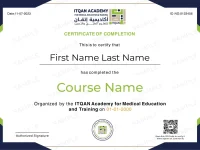
This course aims to equip healthcare professionals with the necessary English language skills required to pass the Occupational English Test (OET). The course focuses on improving communication skills in a medical context, covering reading, writing, listening, and speaking components tailored to healthcare settings. Participants will engage in interactive learning to develop language proficiency and test strategies specific to OET.
Learning Objectives
By the end of the program, participants will be able to:
- Improve their overall English proficiency in a healthcare setting.
- Understand the format and expectations of the OET.
- Practice OET exam techniques for all four language components: reading, writing, listening, and speaking.
- Develop specific skills in reading, writing, listening, and speaking, tailored to the healthcare field.
- Learn strategies to effectively manage time and approach each section of the test with confidence.
- Use appropriate medical terminology in conversations and writing tasks.
General Information about Occupational English Test (OET)
OET Test Components: The OET is divided into four main components, each focusing on different language skills:
- Listening (45 minutes): Candidates listen to health-related dialogues and monologues. This section tests the ability to understand spoken English in a healthcare context.
- Reading (60 minutes): Involves texts related to healthcare topics, assessing candidates’ reading comprehension skills.
- Writing (45 minutes): This section is profession-specific and requires the candidate to write a referral letter, discharge letter, or similar documents, simulating real-life healthcare scenarios.
- Speaking (20 minutes): This is also profession-specific and involves role-play where the candidate takes the role of a healthcare professional, and the interlocutor acts as a patient or a patient’s family member. The focus is on the ability to communicate clearly with patients and colleagues.
Scoring System: The OET uses a grading system from A (highest) to E (lowest). Each grade corresponds to a specific level of proficiency:
- A (500-450): Very high level of performance
- B (440-350): High level of performance, suitable for professional registration
- C+ (340-300): Acceptable level of performance, often enough for limited purposes
- C (290-200): Limited level of performance, improvement needed
- D (190-100) and E (90-0): Low levels of performance, significant improvement needed
Benefits of Taking OET and Why Choose OET?
- Healthcare-Specific: The test focuses on medical terminologies and real-life situations healthcare workers face. Unlike general English tests such as IELTS, making it more relevant for healthcare professionals.
- Professional Relevance and Realistic Scenarios: The test mirrors tasks that healthcare professionals are likely to encounter in their daily work, such as writing medical referrals and interacting with patients. These tasks make it easier to transfer the skills learned into real-life medical practice.
- Recognition by Medical Authorities: Many licensing bodies for healthcare professionals accept OET as proof of English proficiency, making it easier for professionals to register and work in English-speaking countries.
Widely Accepted: It is recognized and accepted by medical and nursing boards across many countries.
Course Content
- Listening Module:
- Overview of the listening test format.
- Practice with healthcare-related audio recordings.
- Focus on understanding patient interactions, consultations, and healthcare scenarios.
- Strategies for answering different types of questions (multiple choice, matching, short answers).
- Reading Module:
- Introduction to the reading test structure.
- Techniques for skimming, scanning, and understanding detailed healthcare-related texts.
- Practice with articles, case studies, and information leaflets from medical sources.
- Test strategies for answering comprehension questions efficiently.
- Writing Module:
- Understanding the requirements of the OET writing test (e.g., referral letters, discharge summaries).
- Practice in writing clear, structured medical documents in a professional context.
- Focus on key areas like grammar, clarity, tone, and medical vocabulary.
- Feedback on practice writing tasks to improve writing quality.
- Speaking Module:
- Role-play scenarios to practice healthcare conversations.
- Focus on interacting with patients, explaining procedures, and providing clear information.
- Strategies for clear, empathetic communication in a medical setting.
- Individual feedback on speaking performance, fluency, and pronunciation
Requirements
Healthcare professionals, who are planning to take the OET to register or practice in an English-speaking country. including
- Doctors.
- Nurses.
- Dentist.
- Paramedics.
- Physiotherapist.
- Occupational Therapist.
- Radiographers.
Assessment:
- Mock OET tests conducted at the beginning and end of the course.
- Continuous assessment through quizzes, speaking role-plays, and writing tasks.
Course format
- Interactive online classes
- Group discussions and peer-to-peer learning.
- Personalized feedback and one-on-one tutoring for weak areas.
- Virtual simulation of OET test conditions to prepare for the exam day.
Course Materials:
- OET-specific practice tests and workbooks.
- Medical English vocabulary guides.
- Listening and reading practice materials based on real-life healthcare scenarios.
- Model referral letters and writing templates for practice.
How Can I Get a Completion Certificate

Attend
The course.

Participate
in Case scenarios, quizzes and discussion

Submit
The course feedback
FAQ
What is the grading system for the OET?
The OET uses a grading system from A (highest) to E (lowest). A grade of B or higher is generally required for professional registration.
What is the format of the course?
The course will be conducted in an interactive online format, with group discussions, peer-to-peer learning, and personalized feedback.
Is there a certification upon completion of the course?
Yes, upon successful completion of the course and participation in assessments, you will receive a completion certificate.
How Can I Get a Completion Certificate?
- Attend the course.
- Participate in Case scenarios, quizzes and discussion
- Submit: The course feedback
What materials will be provided?
The course will provide OET-specific practice tests, workbooks, medical English vocabulary guides, listening and reading practice materials, and model referral letters and writing templates.
Learner Reviews




Case Studies